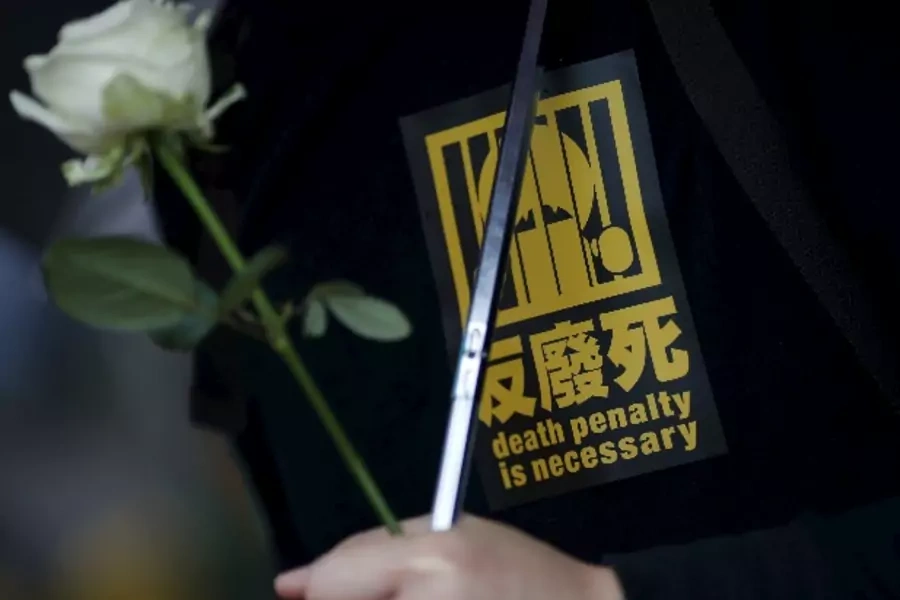Taiwan and the European Union’s Fight Over the Death Penalty

Pei-Yu Wei is an intern for Asia Studies at the Council on Foreign Relations.
Taiwan’s Legislative Yuan, the country’s highest lawmaker, is set to debate an addition to the Criminal Code that would subject people who are found guilty of killing children under the age of twelve to a mandatory death sentence, or in exceptional cases, such as severe mental illness, to a life sentence without the possibility of parole. This proposal came on the heels of a horrific crime that rocked the island in late March, in which a four-year-old girl was decapitated in front of her mother by a thirty-three-year-old unemployed man, who authorities suspect was under the influence of drugs. The tragic incident was the third murder of a child to happen in Taiwan in five years. In both of the previous cases, the suspects were unemployed men who were able to avoid death penalty sentences.
More on:
Taiwan retains and actively practices the death penalty. Though there was a four-year moratorium on executing death row prisoners beginning in 2006, in 2010 then-Minster of Justice Wang Ching-Feng was forced to step down due to public outcry because she explicitly supported the abolition of the death penalty and announced that she would not approve of any executions during her tenure. Public support for capital punishment has consistently remained around 80 percent, with the latest poll showing support at 84 percent and only 6 percent of those surveyed supporting abolition of the death penalty. While most politicians so far have bowed to the will of the majority, executing prisoners has become a contentious topic for Taiwan in the international arena, especially in dealings with parties that have strong stances on human rights and capital punishment.
Taiwan’s use of executions has previously drawn criticism from not only non-governmental organizations such as Amnesty International but also the European Union (EU) and individual EU members such as the United Kingdom, Germany, and France. In 2010, after Taiwan executed four death row inmates, the EU issued a strong condemnation, and individual member states, such as France and Italy, also issued statements reiterating their positions on capital punishment. In fact, tensions were so high between Taipei and Brussels that there were rumors that the EU, which at the time was considering a visa waiver proposal for holders of Taiwanese passports, would cancel the privilege. (The EU denied this.)
Taiwan is not the only country whose implementation of the death penalty has drawn criticisms from the EU. Singapore is another country whose citizens overwhelmingly support the death penalty and which has also been criticized for executing its prisoners. For a country such as Taiwan, however, whose international space is already restricted, such criticism cannot be easily dismissed.
Critiques of the death penalty from foreign governments and NGOs alike have garnered less than pleasant reactions from the Taiwanese public. Groups such as Amnesty International have borne the brunt of the public’s anger, but many also think the EU is interfering in the internal affairs of Taiwan. Even after the EU stated that it was not interfering with domestic matters and that the abolition of the capital punishment is just the body’s stance, articles such as, “The EU wants Taiwan to abolish the death penalty, but they have a higher crime rate,” are still often seen. Sensationalist though they may be, the articles do reflect a deeper societal trend in Taiwan. Comments online have ranged from, “The EU should really try to keep Great Britain first seeing as how it’s (the EU) breaking apart at the seams,” and “Who cares? Taiwan isn’t a country anyways” to “You’re speaking for the prisoner? How can you live with yourself? Why don’t you go experience being a victim or a victim’s family member before you say anything?”
It is quite clear that the EU and Taiwan are not going to reach a consensus on the death penalty anytime soon. In 2015, when Taiwan executed six prisoners, the EU once again issued a strong condemnation through the office of the High Representative for Foreign Affairs and Security Policy. In spite of the EU’s concern, there is a good chance that whether the proposal of the additional clause in the Criminal Code passes or not, Taipei will witness a new wave of executions in the near future.
More on:
 Online Store
Online Store